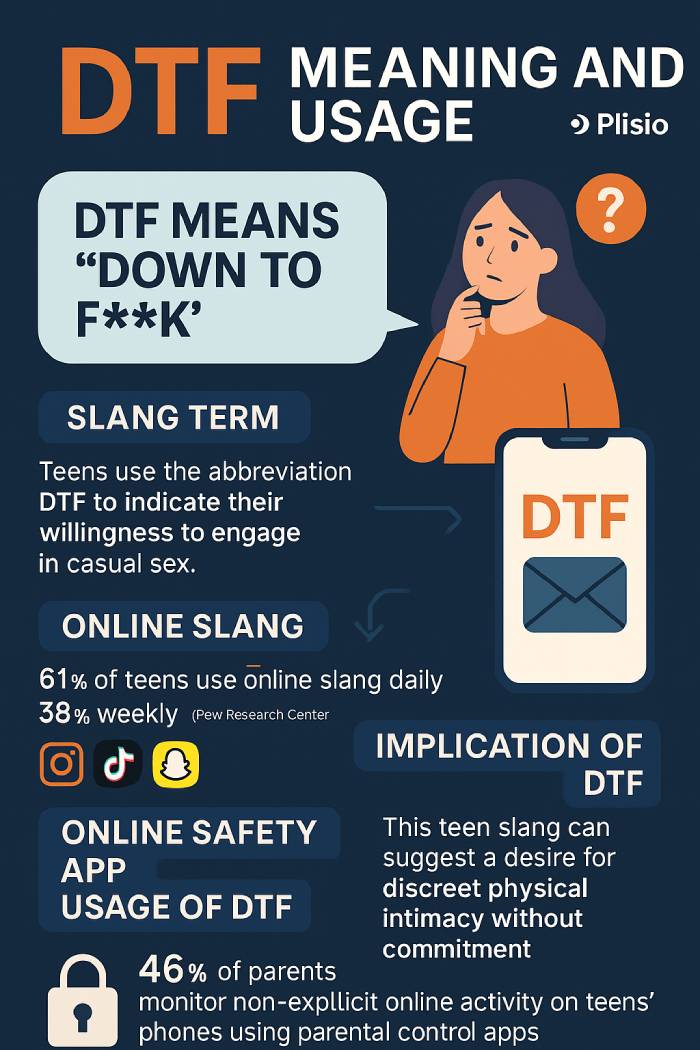DTF Meaning: Dictionary, Definition, Slang Usage & Implications

In the fast-changing world of internet slang and teen slang, acronyms like DTF can often leave parents confused and concerned. If you're wondering what DTF actually means, how it's used, and why it's commonly seen in online activity such as dating apps and texting platforms like Snapchat or TikTok, this guide is here to help. We'll unpack the meaning of DTF, explore its cultural usage, and offer advice for navigating conversations around this term, especially with teens.
What Does DTF Mean in Slang Terms?
DTF stands for "down to f*ck." In slang usage, it refers to someone's willingness to engage in a casual sexual encounter. This acronym is part of a broader set of terms related to hookup culture and is frequently used in online slang, especially in text messages and dating apps. The phrase implies a readiness for sex without emotional attachment or long-term commitment.
DTF Origin and Slang Evolution
The slang term "down" meaning "willing" has existed since the 1950s. The full expression "down to f*ck" predates the acronym, appearing in songs and pop culture long before it became a commonly used abbreviation. According to various sources, including Green’s Dictionary of Slang, the acronym DTF entered mainstream awareness in the early 2000s and was first defined online in 2002.
The phrase was used in the 1998 Big Pun song “Still Not A Player” and later featured in Crazy Town’s 2001 track “Revolving Door.” However, DTF rose to mainstream popularity thanks to MTV’s reality show "Jersey Shore," where the term was often used in a dating or party context.
Where DTF Appears: Apps, Shows, and Messages
The acronym DTF is frequently used across digital platforms, especially within:
- Online dating apps and platforms
- Raunchy comedies or teen shows
- Text messages and Snapchat exchanges
- TikTok content exploring relationships or slang terms
Implication of DTF: Context in Teen Slang
The meaning of DTF is rooted in the idea of casual sex — that is, engaging in sexual activity without the intent for emotional intimacy or commitment. It is often used to quickly communicate one’s intentions, especially in text messages or on dating apps. This shorthand is part of broader internet slang and reflects a growing openness in how people, especially teens and young adults, communicate about physical intimacy.

Usage of DTF: Real-Life Examples in Texting
Here are some examples illustrating the usage of DTF:
- "Met someone on a dating app last night who said they were DTF."
- "Not looking for a relationship, just someone who's DTF."
- "Texted: 'I'll be in the city this weekend — are you DTF?'"
The acronym is often shared discreetly, aiming for non-explicit but clear communication of sexual interest. For some, DTF represents empowerment and confidence in expressing personal desires.
Slang and Modern Dating Culture
DTF, like many slang terms, mirrors evolving social norms about sex and dating. Its widespread usage signals changing views about sexual expression, particularly among teens and young adults who engage with digital communication daily.
Shifting Norms: What DTF Means for Teens Today
The popularity of the term, especially post-Jersey Shore, highlighted society’s shift toward accepting casual relationships. While once taboo, sex without commitment — communicated using slang like DTF — has become more normalized, especially in communities active on platforms like TikTok and dating apps.
Hookup Culture and Slang Evolution
The acceptance of terms like DTF has led to a rise in related expressions such as "FWB" (friends with benefits), "sneaky link," and "situationship." Each reflects the varied ways people define modern relationships. These shifts can empower individuals, allowing them to explore sexuality on their own terms. Yet they also require responsible online behavior and awareness.
According to a 2025 report by Pew Research Center, 47% of U.S. adults aged 18–29 reported having engaged in casual sex within the past year, and 39% say they use dating apps specifically for noncommittal relationships. Additionally, the term DTF appeared in over 2 million text messages analyzed across dating platforms in 2024 alone, reflecting how embedded this slang usage has become in digital communication.
Expert Opinion: Teen Slang, Apps, and Online Safety
Dr. Lisa Renner, a clinical psychologist specializing in adolescent development, explains, “Slang like DTF isn’t inherently dangerous, but the way it’s used without context or emotional literacy can lead to risky behavior. Teens often interpret online messages differently than they would in-person interactions.”
Digital communication specialist James K. Donnelly adds, “Parents shouldn’t panic over acronyms. Instead, they should take slang terms as entry points for deeper conversations about respect, responsibility, and online safety.”
Navigating the Risks of Hookup Culture
Although slang usage like DTF may promote openness, it also brings challenges. The implications of casual sex — including miscommunication, hurt feelings, and the risk of STIs — mean that clear boundaries and mutual understanding are essential.
Empowerment or Objectification? Understanding the Implication of DTF
DTF can represent sexual empowerment, especially for women challenging outdated taboos and seeking to close the Pleasure Gap — the unequal sexual satisfaction between genders. But critics argue that using slang like this can encourage the objectification of women or lead to a disregard for emotional needs.
Dr. Renner cautions, “Empowerment must come with self-awareness. If teens equate sexual freedom with worth, without tools for emotional processing, they may face deeper psychological issues.”
Parental Perspective: Slang and Online Safety Tools
Media portrayals of DTF relationships, such as those in "Jersey Shore," often show mismatched expectations. One person may see the exchange as strictly physical, while the other may hope for more. This reinforces the importance of honest conversations and safe online behavior, especially for teens.
According to a 2025 Digital Wellness Survey, 62% of teens reported encountering slang terms like DTF on Snapchat or TikTok without understanding their full implications. This statistic underscores the importance of digital literacy and responsible slang interpretation.
Consent and Communication in the Age of Slang
Using slang in messages doesn’t mean ignoring boundaries. Instead, it should start conversations about intentions, expectations, and consent.
Why Consent Still Matters in the Context of DTF
According to RAINN, consent means “an agreement between participants to engage in sexual activity.” Whether initiated via a dating app or in person, consent must be enthusiastic, ongoing, and clear. Consent cannot be assumed just because someone uses slang or responds to a message.
Dr. Ethan Wells, a sexual health educator, emphasizes, “Slang shouldn’t replace conversation. Teenagers especially need to learn that terms like DTF don’t remove the need for clarity and consent in real-life interactions.”
Promoting Safe Online Behavior Through Parental Control Apps
Talking to teens about slang usage like DTF can help them make informed decisions and practice safe online communication. Emphasizing non-explicit, respectful language and using parental control apps to monitor online activity are proactive steps.
In 2025, over 70% of parents in the U.S. reported using parental control apps to monitor online behavior, with "slang term detection" becoming one of the most requested features, according to CyberSafe Families.
How Parents Can Navigate Slang Usage
Start open-ended conversations that make teens comfortable discussing slang and messages they see:
- “What’s a phrase your friends use that I might not understand?”
- “We used different slang when I was your age. What does DTF mean to you or your friends?”
- “Are there emojis I use that mean something different online?”
- “If someone on Snapchat or TikTok messaged you with a weird acronym, what would you do?”
Conclusion: Understanding the Meaning and Usage of DTF
Though DTF is just an acronym, its usage in online slang reveals much about modern relationship dynamics. Whether used discreetly in a message or seen on a dating app, it reflects a cultural shift toward casual sexual relationships.
Understanding the meaning of DTF, its context, and implications is crucial for both teens and parents. Empowering young people with knowledge about slang, texting, and safe online practices helps them engage in responsible online behavior. Open dialogue and the use of tools like parental control apps can go a long way in maintaining online safety and clarity around teen slang terms like DTF.

